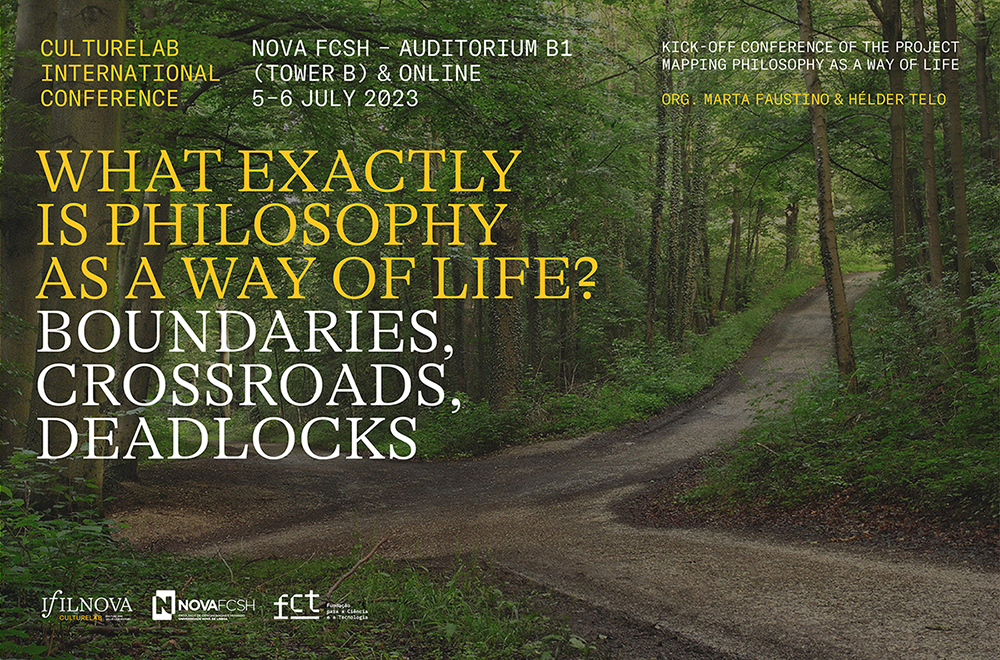What Exactly is Philosophy as a Way of Life? Boundaries, Crossroads, Deadlocks

IFILNOVA / NOVA University Lisbon
5–6 July 2023
Kick-off conference of the Exploratory Project “Mapping Philosophy as a Way of Life: An Ancient Model, A Contemporary Approach”.
Over the past few decades, the idea of philosophy as a way of life (PWL) has gained undeniable prominence in contemporary philosophical debates. Pierre Hadot forged the notion to denote the specific way in which ancient philosophers conceived of and practiced philosophy, stressing its performative character and its potential for self-transformation on the basis of what he called “spiritual exercises”. Furthermore, he also implied that some modern and contemporary philosophers came close to this model of philosophical practice and described it as his own metaphilosophical ideal. Hadot’s account, followed by the late Foucault’s own reflections on philosophy’s practical and performative potential, has inspired recent scholarship to define PWL as a metaphilosophical model that can be fruitfully used to (re)read the history of philosophy in an alternative and illuminating way. Some have also argued that PWL is an innovative methodological approach to the study, research and teaching of philosophy, that might enable a transformation of philosophical practices in the context of modern universities. Not coincidentally, these are the two axes of the contemporary discussion on PWL that this project aims to explore.
However, as much as the expression “philosophy as a way of life” has entered contemporary philosophical debate, there is still much to discuss regarding what it entails and what distinguishes it from other possible ways of conceiving of and practicing philosophy. Despite several attempts to define and characterise this model (by authors such as John Cooper, Michal Chase, John Sellars, Matthew Sharpe and Michael Ure, to name just a few), consensus has not yet been reached, and discussion is still underway. The complexity is even greater if we consider related notions such as “art of living”, Foucault’s “aesthetics of existence”, Martha Nussbaum’s “therapy of desire”, or Peter Sloterdijk’s ascetology, among others. While this complexity and diversity might be fruitful, it can also introduce much ambiguity in discussions or even hinder further work in the field.
The kick-off conference of the project will thus be dedicated to a conceptual and metaphilosophical discussion of the PWL model, trying to determine its boundaries, features and distinguishing marks, as well as the crossroads and deadlocks it might still face and possible ways to overcome them. This will involve addressing a series of controversial open questions, which include, but are not restricted, to the following ones:
- Determining the main distinguishing marks of PWL and contrasting it with other conceptions of philosophy;
- Contrasting the specificity of PWL when compared to other ways of understanding philosophy that equally stress its practical and life-changing potential (Foucault, Nussbaum, Sloterdijk, etc.);
- Clarifying the practical and performative component that is generally associated with PWL and analyzing its impact on the very object of philosophical (theoretical) concern;
- Defining Hadot’s notion of “spiritual exercises” or Foucault’s closely related term of “technologies of the self” and classifying them into different typologies;
- Analyzing the specificity of philosophy compared to other currently available “arts of living”;
- Reflecting on the boundaries that distinguish philosophy from other spiritual practices, such as religion, psychotherapy, self-help, etc.
- Exploring the methodological relevance of PWL to the study, teaching and outreach of philosophy, when compared to current academic methods and practices;
- Addressing common criticisms and concerns related to PWL;
- Discussing the main crossroads and deadlocks in the contemporary debate on PWL and addressing possible limits to the PWL understanding of philosophy.
Org. Marta Faustino (NOVA University of Lisbon) & Hélder Telo (University of Beira Interior)
Attendance is free. Registration for online attendance required via email to mapping.pwl@gmail.com.
Kick-Off Conference – MAPPING PHILOSOPHY AS A WAY OF LIFE (unl.pt)
Programme
July 5
09:15 Opening
09:30 John Sellars (Royal Holloway, University of London): “On the Idea of ‘Spiritual Exercises’”
10:30 Eli Kramer (University of Wrocław): “Speculative Philosophy as a Spiritual Exercise” (co-author Laura Mueller)
11:30 Coffee Break
12:00 Jordi Crespo (Pompeu Fabra University, Barcelona): “From Galen to Loyola: Some Remarks about the Foundations and Scope of Philosophy as a Way of Life”
13:00 Lunch
14:30 Elettra Stimilli (Sapienza University of Rome): “Philosophy as a Way of Life Between Spiritual Exercises and Critical Practices”
15:30 Leonard Waks (Temple University): “Philosophers: Academic Professionals or Life-Guiding Sages?”
16:30 Coffee Break
17:00 Pawel Odyniec (Karlstad University): “Philosophy as a Way of Life Around the Globe: The Case of Krishnachandra Bhattacharyya (1875-1949)”
July 6
09:30 António de Castro Caeiro (NOVA University Lisbon): “Philosophy—On ‘Doing’ One’s Way of Being”
10:30 Hélder Telo (University of Beira Interior): “Philosophical Dogmas or Questions? A Defense of Philosophy as an Inquisitive Way of Life”
11:30 Coffee Break
12:00 Fábio Serranito (University of Leeds): “Philosophy as a Way of Life as a Matter of Life and Death: An Aristotelian Take on a Current Debate”
13:00 Lunch
14:30 Matthew Sharpe (Deakin University): “Philosophy as a Way of Life, the System, and the Advent of the Research University: Contributions Towards an Unwritten Chapter of the History of PWL”
15:30 Matteo Stettler (Deakin University): “‘Intellectual Felicity’ in the Latin Averroists: Exploring the Limits of Hadot’s Metaphilosophy in the Middle Ages”
16:30 Coffee Break
17:00 Gianfranco Ferraro (Open University, Portugal): “Philosophical Spirituality and PWL: The Academic Word Between a Utopia Without Condition and the Risks of a Passive Revolution”
18:00 General discussion

